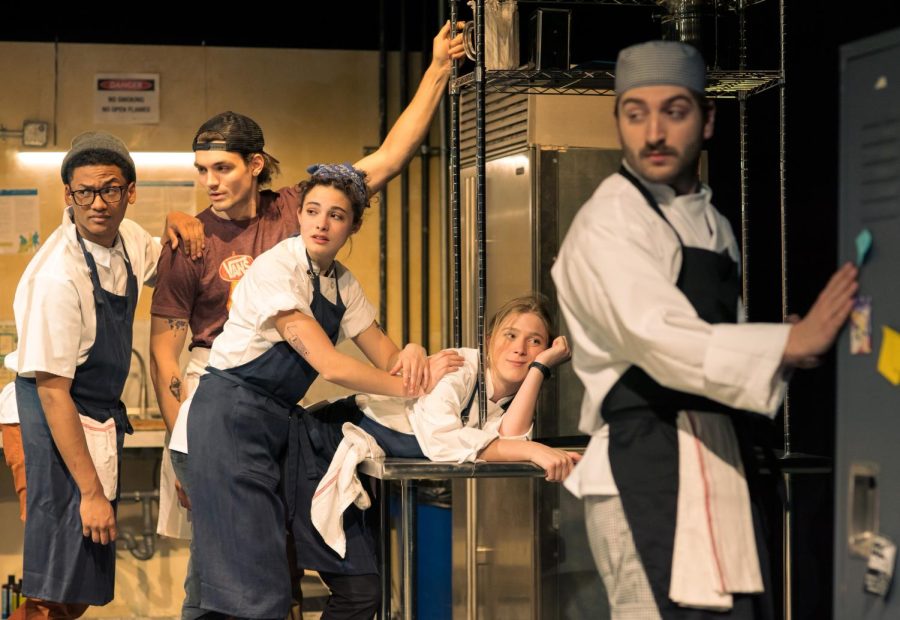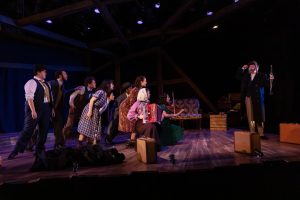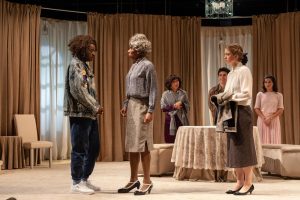World Premiere of ‘La Cocina’ Leaves the Stage Sizzling
Fordham Theatre touches on the struggles of working-class employees and immigrants in its final mainstage production of the semester
COURTESY OF CASON DOYLE
‘La Cocina’ detailed nuances of labor exploitation set in a New York City restaurant kitchen.
May 3, 2023
“La Cocina,” a Fordham Theatre mainstage production, takes place in the hot-tempered kitchen of a well-established restaurant that relies on the hard work (and subliminal exploitation) of its working-class employees. The play, written by Interim Head of Playwriting Tony Menesses, ran from April 13 to April 22 in Pope Auditorium and was the final mainstage show of the semester.
The setting, all within a day’s work, begins with the employees clocking in, watching the kitchen and waiting staff trickle into an expansive restaurant full of everyone’s food service classics: brown crate barrels doubling as seats and tables, stainless steel surfaces with century-old stains, cubbies with forgotten memorabilia. The set of “La Cocina” — designed by Katie Heaton, Fordham College at Lincoln Center (FCLC) ’23 — could not be more perfectly staged.
The kitchen staff chew the fat as they come into work, gossiping about the drama among their co-workers from the night before, which makes up the meat of “La Cocina’s” main conflict: the exploited workers behind the food being prepared. The audience catches glimpses of each worker’s perspective, piecing together that Wesley (Aiden Castillo, FCLC ’26), a waiter who attempted to kiss Pablo (Josiah Rivera, FCLC ’23), a kitchen worker, on the cheek. This led to a physical altercation between the two and a threat from Wesley to call Immigration and Customs Enforcement (ICE). Though Wesley doesn’t follow through on this, the mere mention of calling ICE frightens the migrant workers who compose a majority of the custodial staff.
“La Cocina’s” central plot brings attention to the food service industry’s reliance on the exploitation of migrant workers, who are typically overlooked, overworked and underpaid. The other staff members display an envious acceptance to take on the remaining “back-of-house” workload, a term utilized in the restaurant scene to refer to the preparations customers don’t see. This is also frustrated by extra work that other staff members have deemed outside of their realm of responsibility.
This nature of workers being juxtaposed against one another demonstrates a cyclical nature of exploitation: The staff can afford neither friend nor foe as their personal relationships come second to the rule of Sylvia (Isabella Acuña, FCLC ’25), the restaurant manager.
Sylvia delivers a series of hoops through which the staff must jump, bringing tensions to a mere simmer. The feared manager uses the group’s worries of termination against them, even making newcomer chef Monique (A’ryee Innocent, FCLC ’23) choose between two staff members to be terminated by the end of her first shift. Acuña brings a sickly sweet delivery to the character, leaving no room for personal responsibility, as she pits the staff against each other to watch from her high tower.
“La Cocina” tells a story of class, culture and exploitation all centered around the heart of a community that emerges from a diverse working-class staff.
Everything about Sylvia, from her sequined clothing to her sharp tone, speaks to a larger movement of figureheads who see value in the commercialization of culture. This was also thematically represented in the production’s program, which features the names of French dishes and kitchen roles, despite the assumption that the kitchen will be producing Latin food based on the play’s Spanish name. During the show itself, the menu seems to be more of a collection of fancy dinner dishes, further bringing attention to the exoticized marketability of culture and the “authentic” dining experience.
Tensions rise as Pablo becomes increasingly frustrated with his position in life as a kitchen worker and reaches a full boil when he contemplates whether there can truly be more to life. Pablo craves an escape from the restrictive nature of his job at Sylvia’s restaurant and yearns for mutual trust and respect unattainable for the subordinated working class.
Pablo’s struggles are further accentuated when a homeless man, who was a veteran, enters the kitchen through the back door and asks for food. Though each staff member empathizes, none jump to help him because doing so would put their own employment at risk. Individually, the staff might have helped this man, but they have no agency in accommodating his request — the food is not theirs to give away, plentiful as it may be. A former veteran on the staff, Paul (Nathan Brenn, FCLC ’23), refuses to let the man go unfed. In offering him a plate, Paul loses his job.
Ultimately, “La Cocina” tells a story of class, culture and exploitation all centered around the heart of a community that emerges from a diverse working-class staff. There is very little that links these characters to one another aside from their absolute reliance on employment: A story known all too well by many working-class people and immigrants across the United States.













